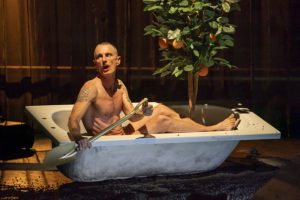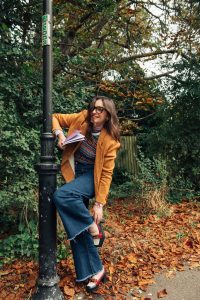Last Updated on June 23, 2025
A Batty Die Fledermaus
3.5 out of 5.0 stars
It’s been a busy summer of opera for me with performances and Glyndebourne, Garsington and now The Grange Festival. The festival is run as an arts charity and has been taking place since its inauguration in 2017 on the stunning Grange estate in Hampshire, owned by John Baring, Lord Ashburton. English Heritage takes care of The Grange, the Grade I-listed building currently undergoing renovations, where the festival’s intimate theatre was built in 2002 in the building’s old Orangery/Picture Gallery. The house dates back to the 17th century, and the National Gallery architect, William Wilkins, later converted the property into the first Greek Revival house in Europe. It is now in the form of a classical temple with its signature Doric portico, a copy of the Theseion in Athens.
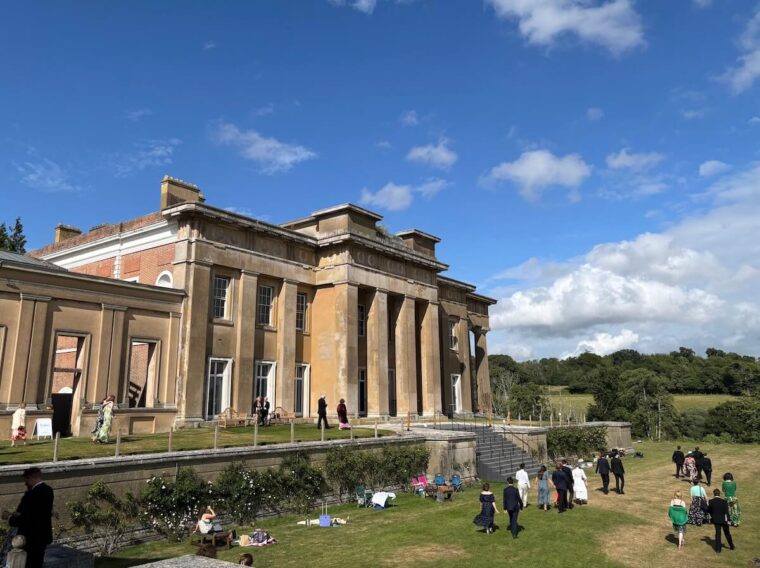
The Grange Festival 2025, running from June 4 to July 6, is described as being opera-based and features a much more diverse line-up than either Glyndebourne or Garsington. Highlights include the premiere of a new staging of Verdi’s La Traviata, directed by Maxine Braham, featuring Samantha Clarke as Violetta, and with Richard Farnes conducting the Bournemouth Symphony Orchestra. Also on the bill is the UK premiere of a bold, hip-hop-infused interpretation of Rameau’s Les Indes galantes, which we are reviewing. Beyond opera, the festival welcomes the return of Ballet Black in a contemporary ballet double bill. Additionally, it features a range of concerts, including Summertime Swing with the Jazz Orchestra of the Concertgebouw and Fay Claassen, Bernstein on Broadway, and for all Freddie Mercury fans, Queen at the Opera.
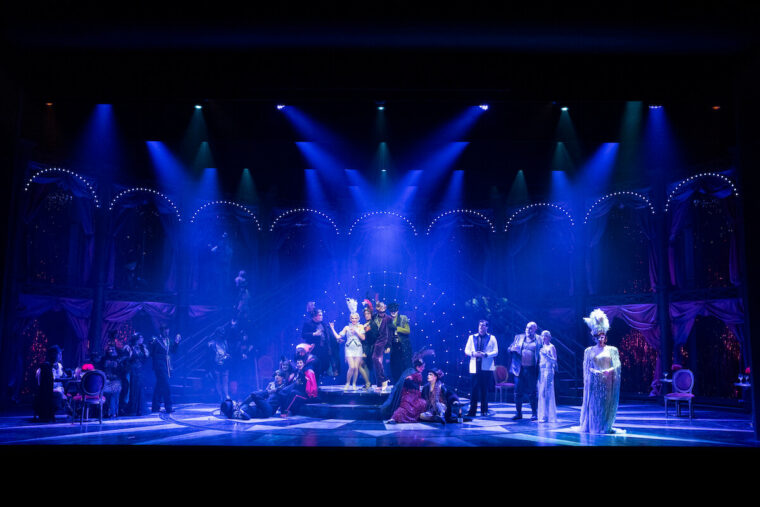

But I’m at The Grange for Johann Strauss II’s effervescent operetta Die Fledermaus (The Bat), which premiered in Vienna in 1874. It has become the quintessential Viennese operetta, transcending the genre, and the masterpiece of the so-called “Golden Age” of operetta. The libretto, by Karl Haffner and Richard Genée, adapts the French vaudeville Le Réveillon by Meilhac and Halévy, which in turn is based on a German burlesque. Strauss’s score captured the city’s joie de vivre and, within six years of its premiere, had been staged in over 170 theatres in the German-speaking world. The Grange production is in English with surtitles and uses barrister and writer John Mortimer’s 1989 translation for the Royal Opera House. Whilst it sometimes veers too far into G&S territory, Mortimer’s words are chock full of jokes and have been updated with contemporary references to the Reform Party and other appalling manifestations of societal decline.
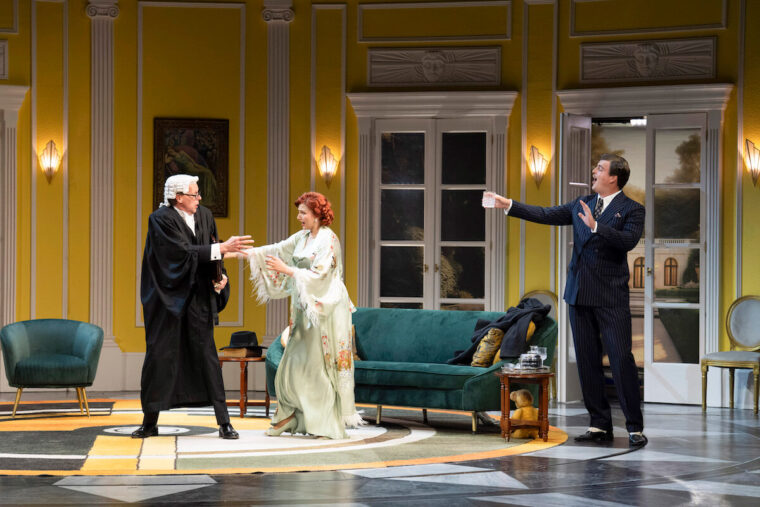

The plot centres on Gabriel von Eisenstein, his wife Rosalinde, her maid Adele, and the mischievous Dr. Falke, who orchestrates a farcical night of mistaken identities and comic revenge at Prince Orlofsky’s lavish ball. The operetta’s structure combines spoken dialogue and musical numbers that feature waltzes, polkas, and galops, so associated with Vienna, lampooning the hedonistic champagne culture of the time.
Director Paul Curran and designer Gary McCann have created a stylistic mishmash of a production fuelled by a camp and energetic joie de vivre that veers off in all sorts of directions like an out-of-control Roman candle, but that just about works. There is a lot of physical comedy and snappy choreography to compensate for the uneven tone.
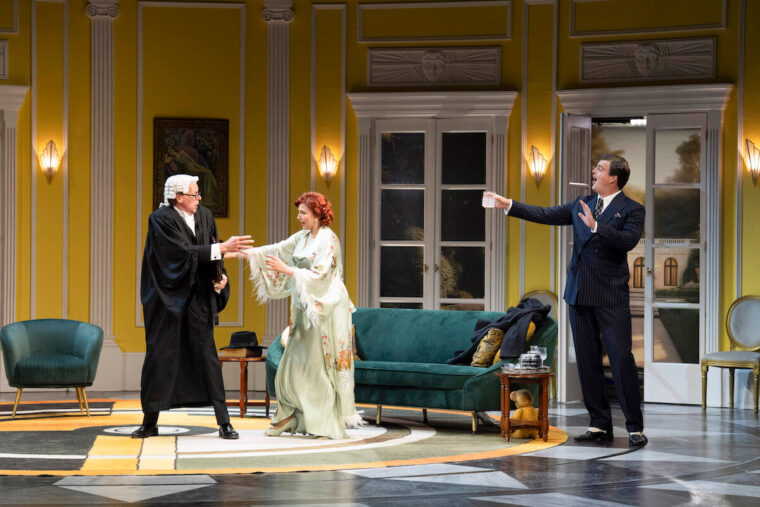

Act 1 is set in von Eisenstein’s 1920s era drawing room, stylishly decked out in yellow, white and green. Andrew Hamilton, a powerful British baritone plucked from the ensemble of the Bayerische Staatsoper in Munich, plays Eisenstein as a delusional rake, always looking to party and chat up any available young actresses. Hamilton’s characterisation is suitably cartoonish, and he displays both vocal agility and a warm vocal tone that will see him moving into less comedic lead roles.
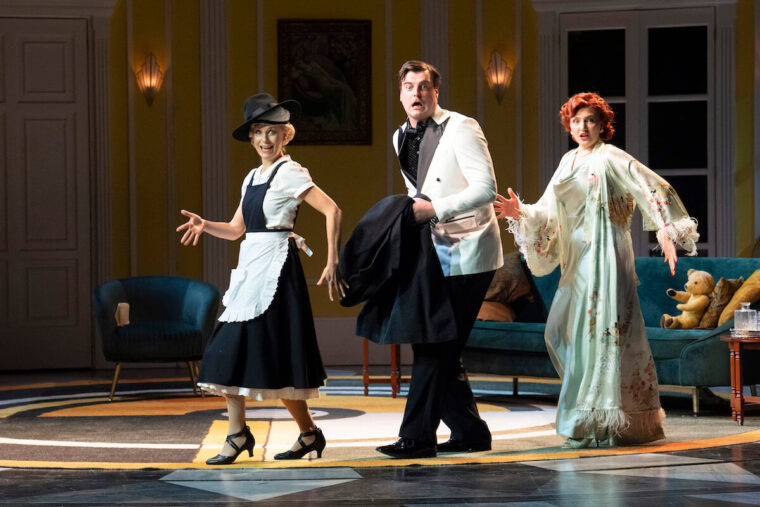

Spanish soprano Sylvia Schwartz plays the beautiful wife, Rosalinde, an entitled princess, immediately surrounded by prospective lovers as her husband is about to begin a jail sentence. Schwartz has a gorgeously lyrical soprano voice, with her character always one step ahead of her hapless husband. Her Act II “Csárdás” aria, when disguised as a Hungarian countess, was delivered with a bravura flourish, and the Watch Duet with her husband was a highlight, showing off both singers’ comic interplay.
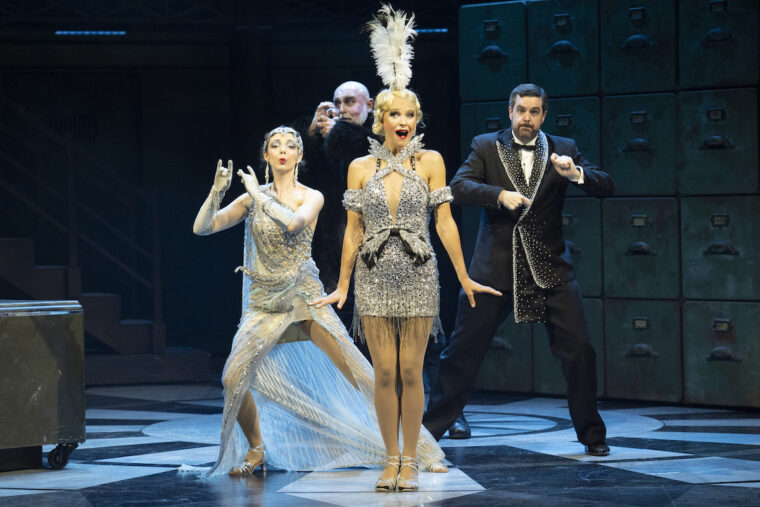

British soprano Ellie Laugharne is Rosalinde’s put-upon maid Adele, dressed in white pinafore and black maid’s outfit and reminding me of Connie Booth’s Polly character in Fawlty Towers, before transforming into a leggy temptress in a silver flapper outfit in Act II. Laugharne’s crystal-toned voice with a full-on “Mockney” accent is featured in the “Laughing Song” (“Mein Herr Marquis”) but is sometimes underpowered compared to the other singers.
Welsh tenor Trystan Llyr Griffiths is hilarious as Alfredo, Rosalinde’s over-the-top Latin lover who is always “trying to compromise me with his top C.” Alfredo is constantly bursting into song, dropping classic operatic arias even when imprisoned and is a singer to watch out for. And another of Rosalinde’s exes, baritone Ben McAteer, gives us a florid, camp Dr Falke, the lawyer who orchestrates von Eisenstein’s downfall.
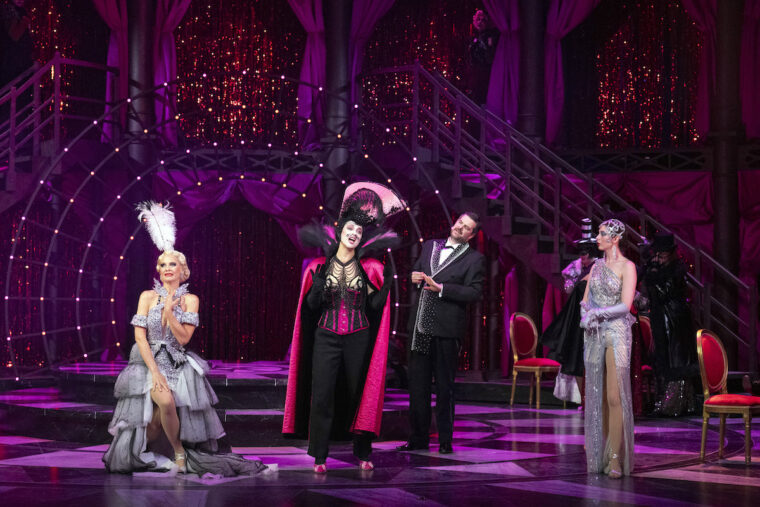

Act 2 is centred around Prince Orlofsky’s party, which takes us to the S&M decadence of Weimar Republic Berlin in a mash-up of the Kit-Kat club, the Moulin Rouge and even our own much lamented Café de Paris. Anglo-German contralto Claudia Huckle plays the trouser role of Prince Orlovsky, giving a pleasingly world-weary rendition of the character’s signature aria “Chacun à son goût.”


Act 3 is set in Frank’s prison, where Eisenstein is meant to be incarcerated, and it is here that the production jumps the shark. The act traditionally opens with a spoken monologue played by a comic in the role of the jailer Frosch. Here, Frosch is played by Myra DuBois, the drag persona of comedian Gareth Joyner. The 4th wall is well and truly destroyed, and suddenly we are transported to the RVT (Royal Vauxhall Tavern). Joyner is hilarious, “Fellas rattle your Viagra”, taking over the show with the rest of the performers struggling to get things back on track. To keep the campy momentum going, English bass-baritone Darren Jeffery, Colonel Frank, transforms amusingly from a bluff, no-nonsense prison officer into a lascivious S&M bear with a dodgy French accent.
Paul Daniel conducts the Bournemouth Symphony Orchestra, who sounded like they were enjoying themselves in an energetic reading of the score with The Grange Festival Chorus at full throttle, sounding both splendid and moving, particularly in the signature Act II waltz “Brüderlein und Schwesterlein.”
Visiting The Grange is a fabulous experience, as both the house and the surrounding estate with its lake, are beautiful. There is on-site catering, and the location offers good transport links. It’s about a 45-minute drive from the M25 junction with the M3, and there is a coach that can be booked from Winchester station.
The Grange Festival
The Grange,
Northington,
Alresford,
Hampshire
SO24 9TZ, United Kingdom
